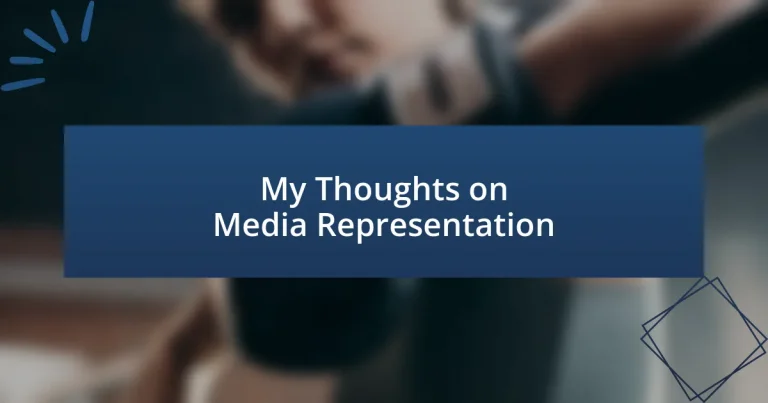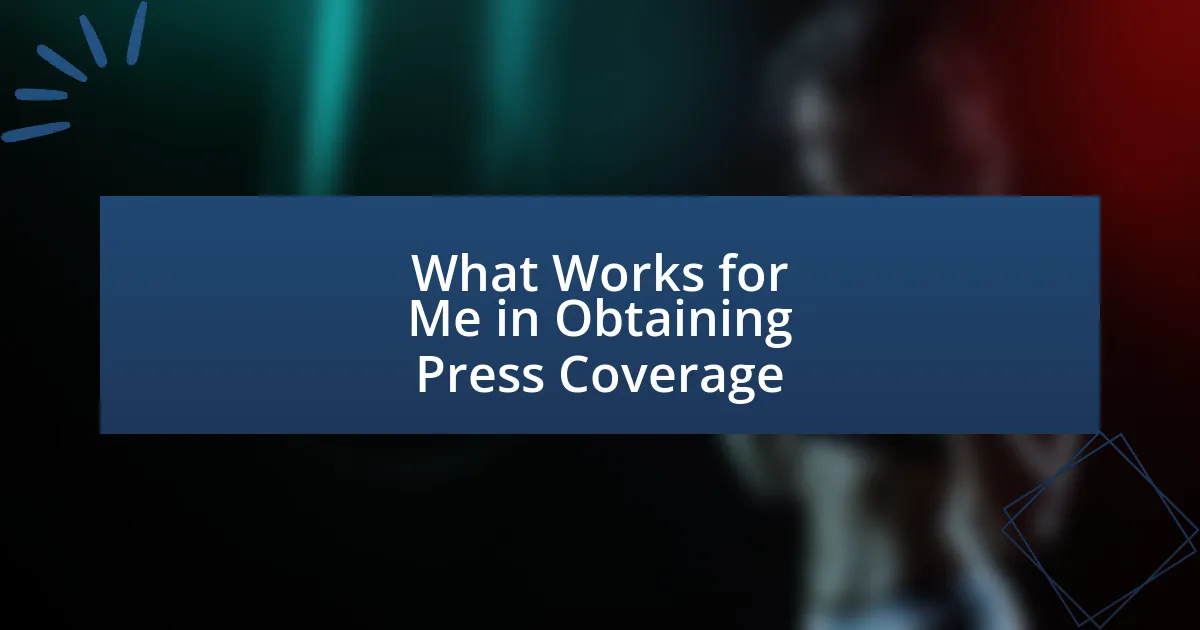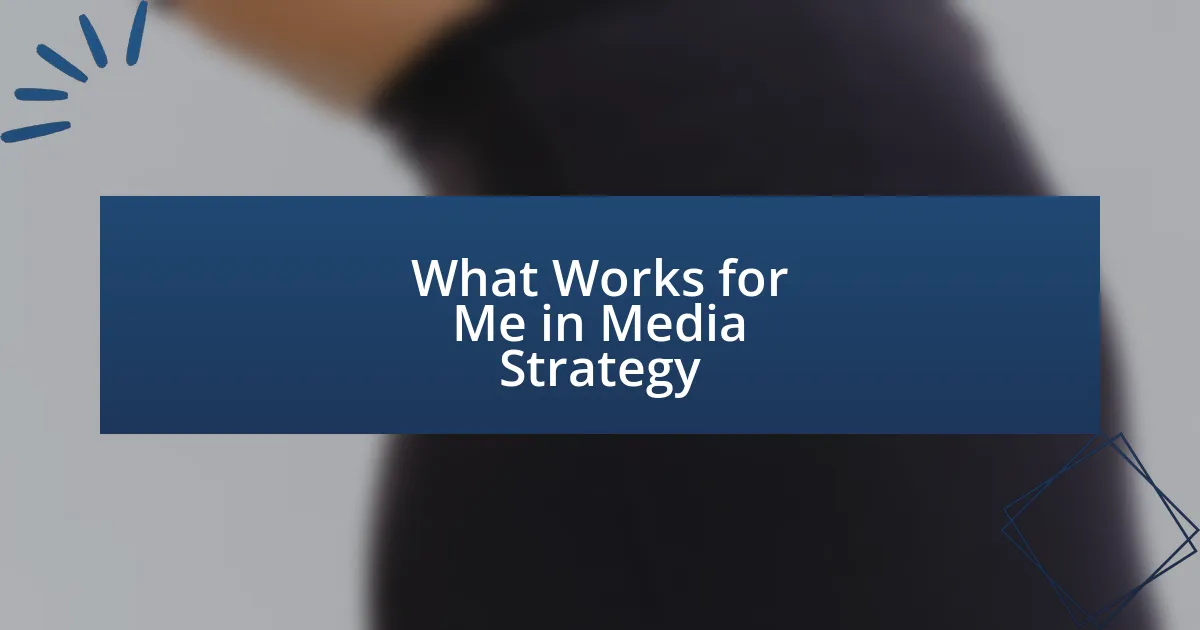Key takeaways:
- Media representation shapes personal identity, societal beliefs, and community connections, emphasizing the importance of diverse and accurate portrayals.
- Misrepresentation can lead to harmful stereotypes, loss of identity, and mental health issues, highlighting the need for authentic narratives.
- Social media platforms offer opportunities for marginalized voices but also risk amplifying misinformation, necessitating a balance between expression and responsibility.
- Strategies for positive change include collaboration with communities, educating creators on representation, and rewarding genuine diversity in content.
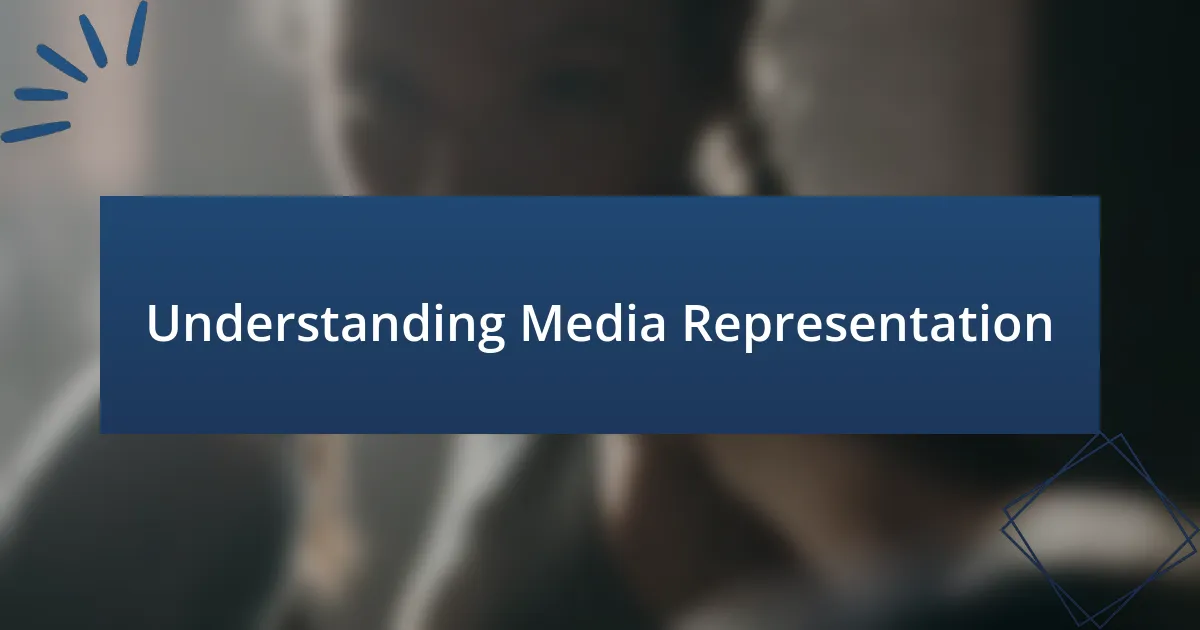
Understanding Media Representation
Media representation refers to how various groups, identities, and ideas are portrayed in different media forms, such as television, film, and social media. I remember the first time I noticed this while watching a movie with friends. We were all excited for a new release, but as the credits rolled, I felt a nagging discomfort—none of the characters reflected my experiences or those of people I knew. This moment sparked a deeper understanding of how important representation is in shaping our perceptions of reality.
Consider how powerful it can be when a diverse range of voices is included in storytelling. It’s not just about seeing different faces; it’s about feeling a connection. Have you ever felt seen in a story, as if someone truly understood your struggles? That sense of recognition can create validation and empathy, while a lack of representation can lead to feelings of isolation and marginalization.
When I think about it, media representation shapes not just our views of others but also our self-identity. For instance, I often hear young people struggling with their self-worth, deeply influenced by the media images they consume. The question is, what responsibility do creators and platforms have in ensuring these portrayals uplift rather than diminish our understanding of one another? Engaging with this question helps unravel the layers of how media can impact us all.
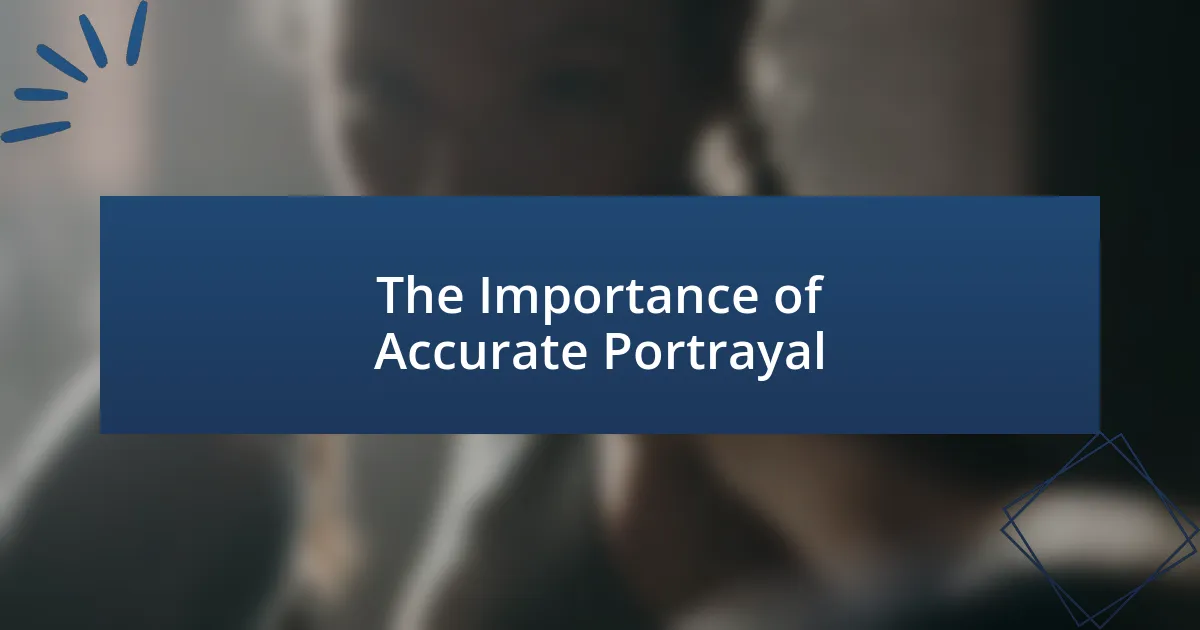
The Importance of Accurate Portrayal
Accurate portrayal in media profoundly shapes societal beliefs and behaviors. When individuals see characters that resemble their own identities, it fosters a sense of belonging and community. Conversely, when representation is skewed or absent, it can perpetuate stereotypes and foster harmful misconceptions. I recall a time when a friend shared their experience watching a show. They felt invalidated because none of the characters reflected their cultural background, highlighting the stark contrast between relatable media and the feelings of alienation that often arise from lack of representation.
The impact of accurate portrayal extends beyond individual experiences. It can influence how entire generations perceive themselves and others. For instance, when I watched a documentary showcasing women in science, it was invigorating to witness both their accomplishments and challenges. It reignited my passion for learning and inspired me to pursue opportunities I had previously considered out of reach. This illustrates the power of seeing diverse representations, allowing future generations to envision their paths without limitations, while also challenging glorified narratives that often overshadow the difficulties involved.
In essence, representation matters not just for those who are represented but for society as a whole. When the stories highlighted in media accurately depict a variety of perspectives, it creates a richer cultural dialogue. I believe that creators carry a significant responsibility to authentically reflect the communities they portray. This aspect raises an essential question: Are we prioritizing diverse, accurate narratives that nurture understanding and respect?
| Accurate Portrayal | Inaccurate Portrayal |
|---|---|
| Fosters belonging and community | Perpetuates stereotypes |
| Inspires future generations | Creates feelings of alienation |
| Encourages varied cultural dialogue | Limits understanding and empathy |
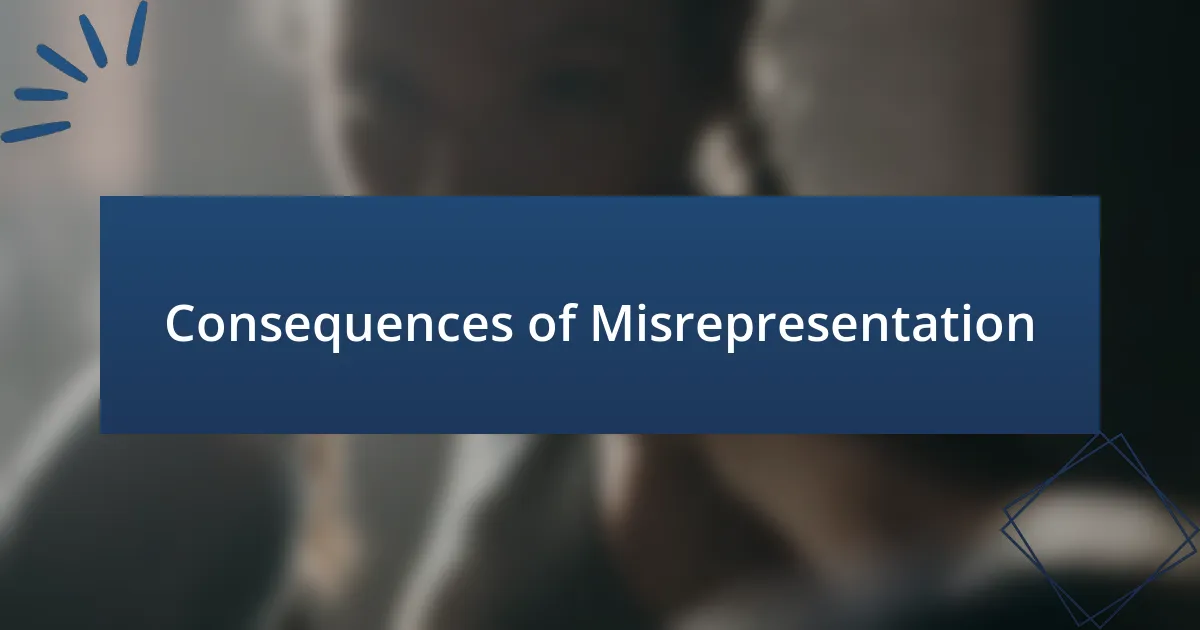
Consequences of Misrepresentation
Misrepresentation in media can lead to significant and lasting consequences for individuals and communities alike. I’ve seen firsthand the frustration that arises when a character based on a specific culture is poorly crafted, often reduced to one-dimensional stereotypes. This not only impacts how those viewers perceive themselves but also how they feel the world perceives them. It’s disheartening to think that someone might internalize these misrepresentations and begin to doubt their worth or place in society.
The ripple effect of skewed portrayals stretches far beyond individual feelings. It can cement harmful stereotypes, leading to broader societal consequences. Here are a few key consequences I believe we must consider:
- Loss of identity: Individuals may struggle to connect with their roots when they don’t see their stories accurately represented.
- Reinforcement of ignorance: Audiences can form skewed views about certain groups, perpetuating misinformation and intolerance.
- Marginalized voices: Misrepresentation often sidelines authentic narratives, diminishing the richness of diverse experiences.
- Worsening mental health issues: The continual struggle to find representation can exacerbate feelings of isolation and inadequacy.
Reflecting on these aspects reminds me that every story matters, and the absence of an accurate representation can quietly alter lives.
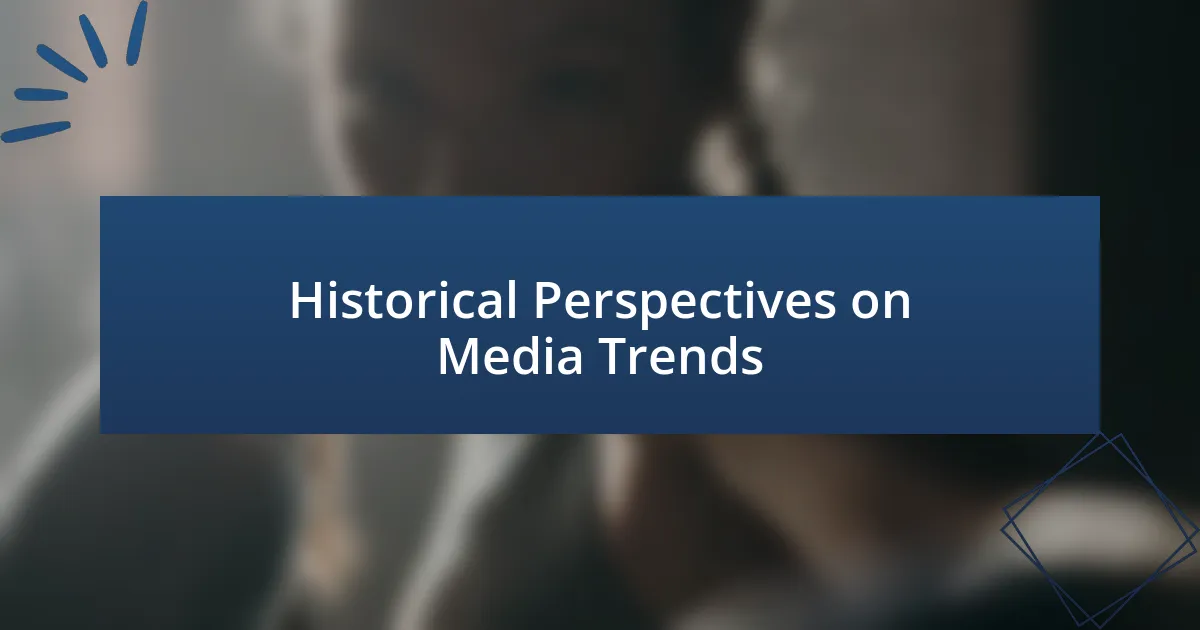
Historical Perspectives on Media Trends
Throughout history, media trends have often mirrored the societal values and prejudices of their time. I recall studying the evolution of television shows from the ’50s, where the idealized nuclear family dominated, to the more diverse and complex narratives we see today. Isn’t it fascinating how these shifts in representation reflect the cultural conversations we’re having?
In the ’80s and ’90s, shows began to take on more social issues, albeit sometimes clumsily. There was a sense of excitement and trepidation as I watched sitcoms tackling tough subjects, yet it struck me that many of these portrayals often fell short, leaning into caricatures rather than nuanced characters. It makes you wonder: Were they pushing boundaries or just skimming the surface of complex realities?
The internet has undoubtedly changed the game, democratizing media in ways we couldn’t have imagined. I remember the thrill of discovering diverse content creators online, sharing perspectives that often went unnoticed in mainstream media. Hasn’t social media transformed how we view representation, allowing marginalized voices to finally shape their narratives?
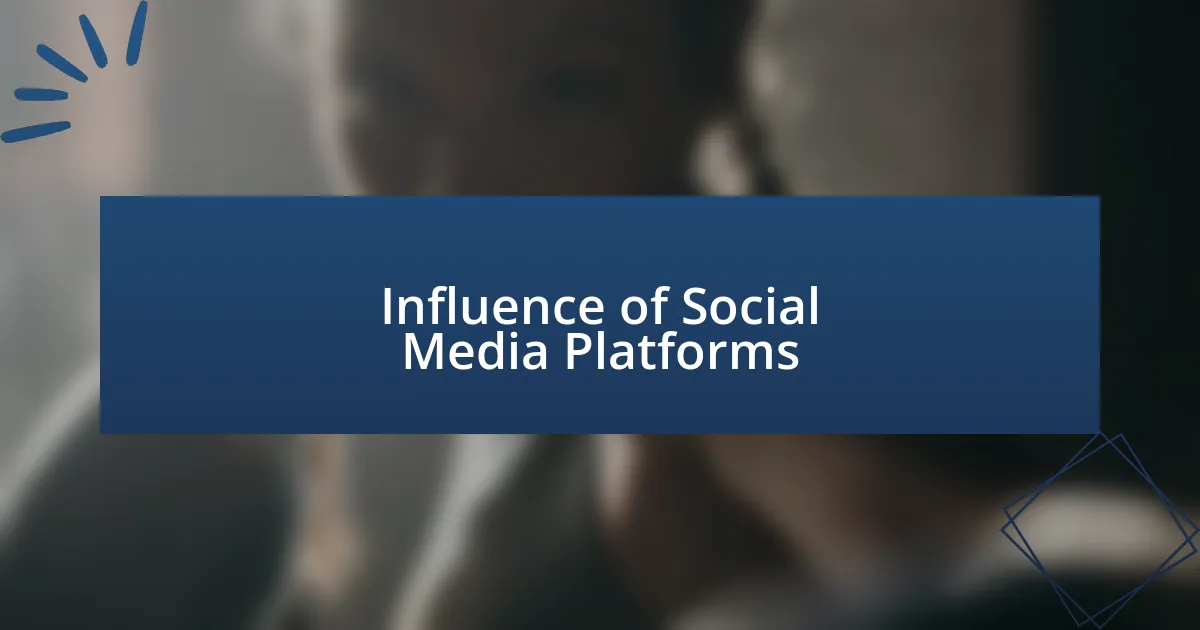
Influence of Social Media Platforms
Social media platforms have revolutionized how we understand and engage with representation. I often find myself scrolling through my feeds, amazed at the variety of voices that resonate in ways traditional media rarely captured. Isn’t it empowering to see individuals sharing their stories, unfiltered and authentic, challenging the dominant narratives that have long prevailed?
Scrolling through apps like Instagram and TikTok, I’ve come across content that not only entertains but educates. One particular video about body positivity made me reflect on my own perceptions of beauty. It was eye-opening to see how different bodies can be celebrated in a way that builds confidence and fosters community, reminding me that representation can spark vital conversations and promote acceptance.
However, the influence of social media is a double-edged sword. While it offers a platform for underrepresented voices, it can also amplify harmful stereotypes and misinformation. I remember a time when a viral trend perpetuated a shallow understanding of mental health issues, leading me to question: how do we strike a balance between expression and responsibility in such an open forum?
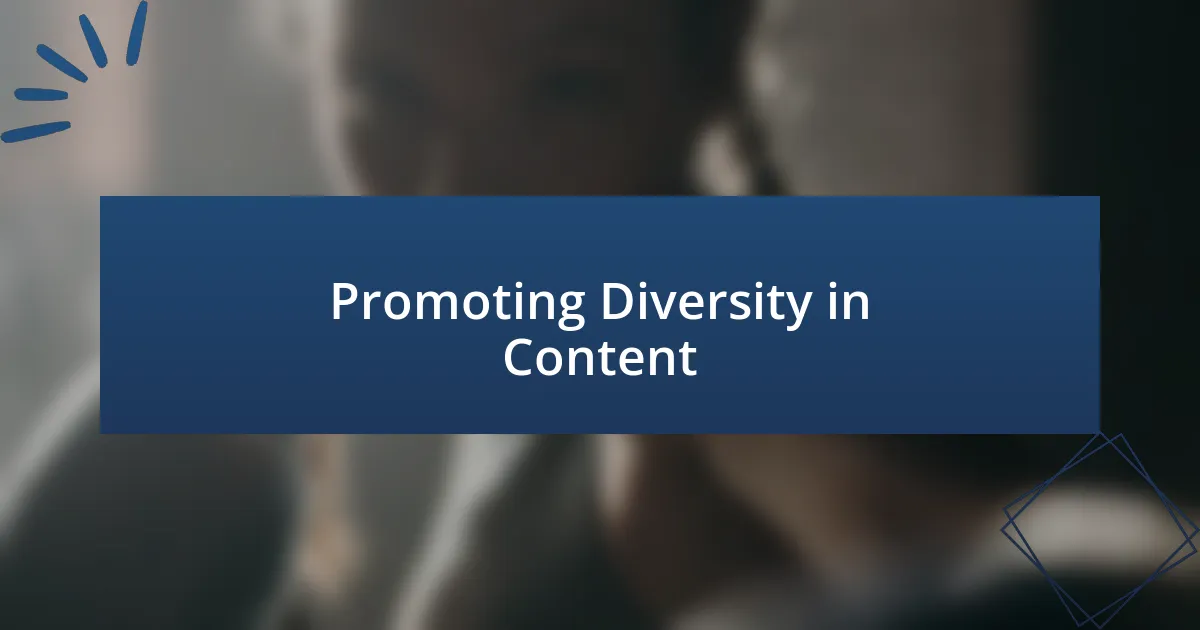
Promoting Diversity in Content
Promoting diversity in content means actively seeking out and amplifying stories that reflect a broad spectrum of experiences. I recall an independent film festival I attended that featured filmmakers from various backgrounds, each with unique narratives. Watching those films, I felt a mix of joy and sadness as they highlighted struggles and triumphs that often go unnoticed in mainstream cinema.
I’ve noticed that when content creators prioritize inclusivity, it enriches the viewing experience for everyone. For instance, a popular podcast I follow recently invited guests from diverse cultural backgrounds, sparking discussions that were both enlightening and necessary. This made me realize how much I had to learn and how collective growth only happens when we embrace perspectives beyond our own.
Moreover, understanding that diversity isn’t just about representation but also about genuine storytelling is crucial. I’ve encountered art that seemed to check off boxes for diversity yet felt hollow because it didn’t truly resonate with the community it sought to represent. It made me wonder: how can creators ensure that their content is not just diverse in appearance but also authentic and impactful?
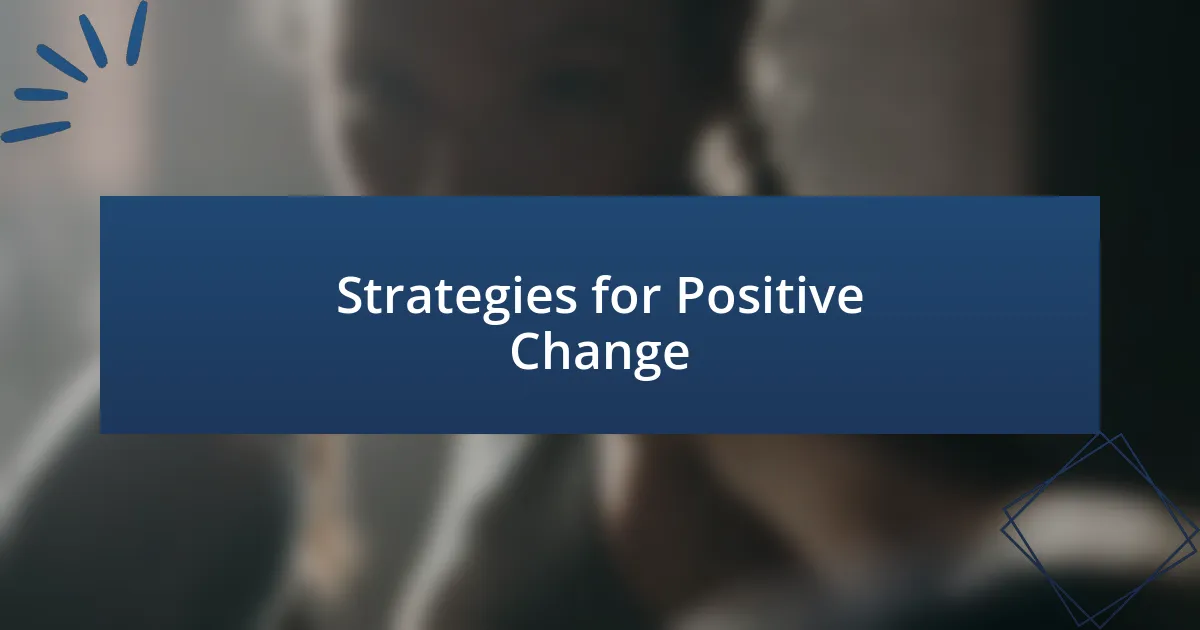
Strategies for Positive Change
To foster positive change in media representation, I believe collaboration between creators and communities is essential. I once attended a workshop where filmmakers partnered directly with local advocacy groups. Hearing the powerful stories shared by community members opened my eyes to nuances I hadn’t considered. It left me wondering how many stories remain untold simply because creators haven’t engaged with the communities they wish to portray.
Another strategy involves educating current and aspiring content creators about the importance of representation. I participated in a university seminar that focused on media ethics and responsibility. The discussions revealed how many young filmmakers were unaware of their impact. It made me reflect on my own learning journey—how can we expect creators to address representation properly if they aren’t equipped with the right tools and knowledge?
Lastly, rewarding genuinely diverse content can stimulate positive change in the industry. I vividly recall the uproar when a well-deserved award was given to a series with authentic representation. It felt like a watershed moment, suggesting that audiences are yearning for more meaningful narratives. Could our collective purchasing and viewing power encourage studios to prioritize quality over formula? The answer lies in making choices that align with our values, thus shaping the media landscape we engage with.
